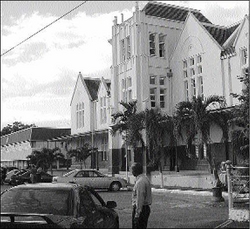
Norman Grindley/Deputy Chief Photographer
Jamaica College in St Andrew.
CAREER CHOICES for senior students at one of the country's oldest secondary institutions, the prestigious Jamaica College (JC), in Kingston, have widened with the introduction of an aviation programme in the school's curriculum, beginning this academic year.
The programme, the first of its kind to be offered at any high school in the English-speaking Caribbean, was recently launched at the Old Hope Road-based institution.
The course is being offered in partnership with local company, The Flying Club. It will operate under the Aircraft Training Organisation's approval granted to The Flying Club by the Jamaica Civil Aviation Authority (JCAA) for a private-pilot licence ground school.
Theoretical and practical
Technical support manager for the Jamaica College Aviation Programme, David Robertson, in an interview with JIS News, said that the curriculum includes both a theoretical and practical package.
"This involves, first, learning about all aspects of the airplane - how the airplane flies, the (various) theories of flight, and how it is able to sustain flight," he said.
"The next module is about the engine, the airplane engine, and how the engine works, how we will be able to fix it, minor repairs. After (the) engine module, we go on to meteorology-aviation weather systems, (understanding) what is safe flying weather and marginal flying weather," Robertson explained.
He added that students would be introduced to navigation, where they would gain an appreciation for different methods of map reading and survival techniques. They also would be introduced to computerised systems to learn more about the aircraft.
"Then we move on to Jamaican air law, which is the equivalent of a road code. It is an air code, following the various laws in the air from a Jamaican standpoint. After that, we learn about what is called weight and balance - how to lower the plane safely," he stated.
Robertson pointed out that the information students would receive in one year compared favourably to that of the private programmes.
"The private programme is sometimes compressed into three or two months, so the year is more than adequate time, especially for students who are hungry for the knowledge," he explained.
Robinson said that the programme was designed to give high-school students an opportunity to take on new opportunities in emerging industries.
"We found the time was right to equip youngsters for the change in the economic climate (so that they can) be as marketable as possible. So, this programme does really cut the line between dream and ambition. There are many who want to become a pilot, but don't know how to go about it, and finances will keep it out of reach. This will show that you can match dream and ambition," he pointed out.
Academic standing
While classes are optional, they will be offered to students in the fourth, fifth and sixth forms, as part of their regular curriculum. To register for the aviation course, students must have the consent of their parents, be in good academic standing, and be disciplined. They also need to be fully competent in reading and writing.
Robertson said that there was collaboration with other high schools in the Corporate Area to invite other sixth formers to join those at Jamaica College. He suggested that, over time, the programme would be expanded to other areas of Jamaica.
"We will get the programme to them, or we will find a way to get them to us; but we have been speaking to schools as far away as Westmoreland and Portland. We will be making sure it comes to fruition by September 2010," he says.
Regarding the cost, Robertson stated that JC students would be charged $18,000 for the course, while all other students would need to pay $21,500. He said that the rates were reasonable, as the programme was being heavily subsidised by past students and stakeholders.
Aviation examination
The course will be offered over one- or two-year periods, after which successful students would sit an external aviation examination administered by the JCAA. JCAA certification is accepted worldwide and is a prerequisite for obtaining a private-pilot licence.
"The programme is set in a way that, the minute you do get through this section, you are on your way. You cannot get a private-pilot licence without this theoretical package now; you are going to have to pass this exam," Robertson added.
The theoretical modules are scheduled to begin this month while flight-training modules are scheduled to start the following academic year, 2010-11. Approximately 200 students have already enrolled in the programme.
Theory will be offered at Jamaica College, while first-year training flights will be offered at a local aerodrome.
- JIS